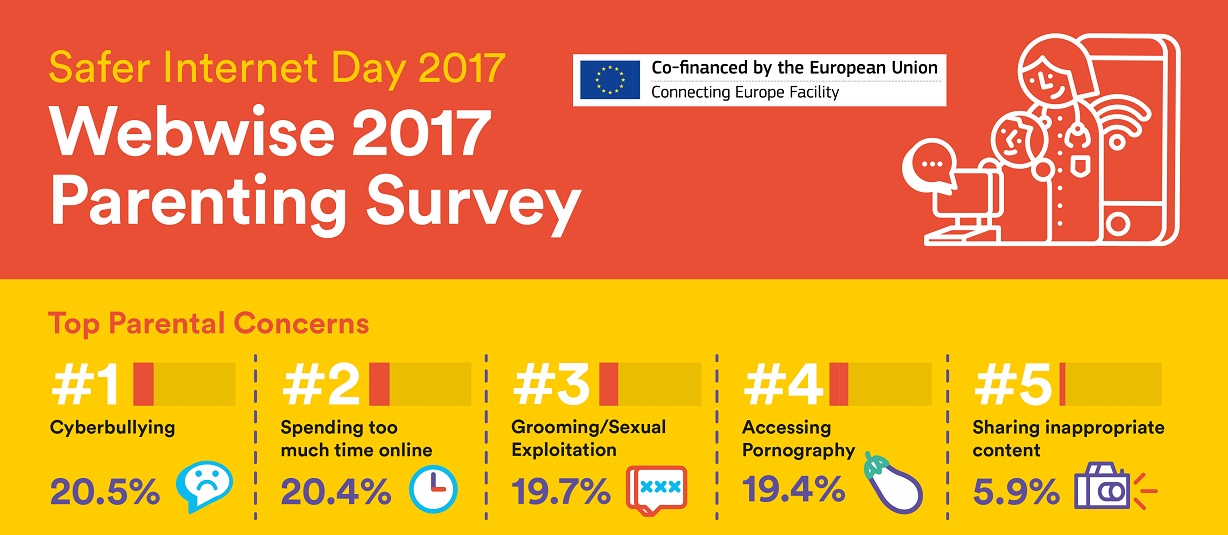The Webwise 2017 Parenting Survey

The Webwise 2017 Parenting Survey is a collaboration between Webwise, the Irish Internet Safety Awareness Centre, and the National Parents Council Primary (NPC). Parents on the NPC mailing list were surveyed regarding attitudes to online risks and safety. 1274 responses were received, covering digital parenting issues for children aged 0-18. Comparison with findings of the 2012 Survey of Parental Attitudes was used to highlight relevant trends in parental attitudes.
The survey addressed 4 main topics:
1) Strategies for digital parenting;
2) Attitudes towards children’s internet use;
3) Concerns about online risks;
4) Appropriate age for social networking.
Strategies for digital parenting
- Parenting approaches towards children’s use of the internet continue to be a mix of ‘restrictive’ and ‘active’ mediation.
- Restrictive approaches include: setting time limits (73%); use of parental controls and filters (39%); as well as monitoring (52%) and supervision (34%).
- 68% of parents who responded also use ‘enabling’ or ‘active’ strategies including regularly talking with their children about what they do online. This is an increase from 62% since the 2012 Survey of Parental Attitudes.
Attitudes towards children’s internet use
- While three-quarters of parents (74%) believe using the internet is important for their child’s education, only a quarter (25%) believe that the benefits of the internet outweigh any risks for their child.
- Parents are quite confident about their own abilities and only 16% say their child knows more about using the internet than they do. Yet, just a third say they can protect their children when they are online.
- 53% are confident of their ability to monitor their children’s use of the internet. But 40% also acknowledge that it is easy for their children to use the internet without the parent knowing.
- Parents’ confidence in monitoring what their child does online has declined from 67% in 2012 to 53% in 2017.
Concerns about internet risks
- 45% of parents say the risks to children of using the internet outweigh the benefits. This is a sharp increase on 25% in 2012.
- Exposure to pornography (71%) and cyberbullying (70%) remain prominent risks cited by parents just as they were in 2012.
- Four main risks stand out in equal numbers as the most serious concerns for parents: Cyberbullying; Spending too much time online; Online grooming or sexual exploitation, and Accessing pornographic content.
- The ranking of top parental concerns remains the same irrespective of the age of the child.
Some parental concerns increase with the child’s age (e.g. accessing pornographic content and damaging their reputation) while other concerns diminish as the child grows older (e.g. online grooming and sexual exploitation). - The concerns that worry parents the most are those that pose a direct threat to the child, e.g.
cyberbullying and online grooming, despite the fact that actual incidence is rare.
The right age for social media
36% of the parents surveyed stated that 13 years and over was the appropriate age for a child to have a social media account, reflecting the current age restriction that applies to most social media platforms.
42% of parents would be in favour of raising the current age threshold for social networking from 13 years of age; 36% would retain it as is and 15% would be in favour of lowering the age limit.
Recommendations
In order to help their children to get the most out of going online, parents need dedicated support and guidance in relation to digital parenting and internet safety. Currently, many of the resources related to this topic are of a one-size-fits-all type. Some of the policy implications arising from the findings in this report include the following:
- Parents need more information and advice targeted to the age and needs of their children in order to help them in supporting their children’s online use.
- There is a need for a national one-stop-shop where parents and professionals working with children can go to get advice that is appropriate to the needs of their children.
- Advice for parents is mainly focused on risk and harm encouraging them to adopt policing and
monitoring roles. - There is very little advice presenting the benefits offered by the internet.
- More support is needed for parents if they are to help their children use technology for learning, building relationships and having fun.
- Parents need resources to help them to use their digital expertise to positively engage with their children.
- There is an ongoing need for a robust and up-to-date evidence base that measures children’s
online behaviour and the related risks.
Download the full report here: webwise.ie/download
Download our infographic here: webwise.ie/download





